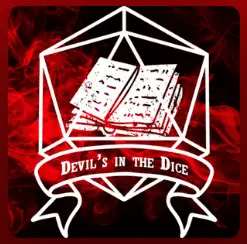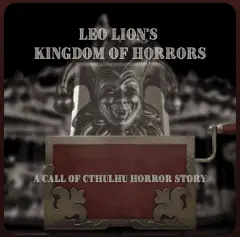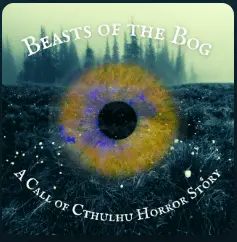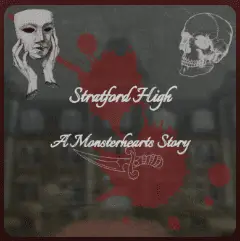Welcome to the first installment of Off Screen: The Craft of Running The Game, a new series where I interview Game Masters of various actual plays to discuss the differences between running a home game and running an actual play.
As both a perma-DM for all of my home games, and a long time fan of the Actual Play medium, I’ve often thought about the differences between the two. One takes place in the comfort of privacy. The pacing and the story exist as an ethereal, malleable pocket universe; where the only watching eyes are your players – ostensibly people who are also your friends.
For an actual play (or narrative play, depending on who you ask) you’re making a piece of art, a narrative to be consumed by people you may never meet. With this series I hope to explore the crunchy craft nuances and technical skills that go into performed play.

Off Screen’s inaugural guest is Tony Kiger. Coming from a theatrical improv background, Tony is the DM of Devils in the Dice, a rotating cast short-form actual play. Tony’s run shows in a number of TTRPG systems like Leo Lion’s Kingdom of Horrors, a theme park horror game using the Call of Cthulhu system, Stratford High, an angsty dark academia game of Monsterhearts, and their most recent Cthulu series Beasts of the Bog.
The following is an excerpt from the full interview, which you can find on your favorite podcast platforms!

What do you believe is the role of the Game Master?
Tony: I think the role of the game master is meant to help the players navigate a story they want to tell within a world you have set up. I think the DM role is extremely collaborative.
When I am running a game, I take a lot of time in the session zero of planning and setting up characters and making my players really feel integrated into the world. So that way they feel a reason to go out and do the things they’re going to do.
I am notorious for not prepping anything. I really do lean on my players to give me that roadmap, because I know I work best when I am reacting to what they’re doing in the moment. I know no amount of planning I can do for a game is going to actually lend itself well to how I run a game. And so I, when I think of the role of the GM, it’s a player in the game just plays multiple characters don’t do as cool of stuff.
Given that style, how does your prep differ in the two different scenarios? For a home game, I think that’s very low stakes to not prep at all, but when you’re setting up a consumable narrative, a piece of art, that’s a much higher stakes situation that you’re in.
Tony: Yes. The big difference I find in my own prep between a home game and something I’m doing for the show… In a home game, my session zeroes are usually just “Hey, what’s your character gonna be? Okay, cool. This is the general concept I have for the game. Let’s just have fun. See what happens.”
With the show, I really look to the players and I go, “What is your character’s big thing they want to do?” I also encourage my characters to think of their relationship to each other coming into the game.

For example, we are actually in the middle of recording our Halloween special for this year, which is a Kids on Bikes game. The best way I could describe that game is if Blue’s Clues and Saw had a baby. In that it’s like a demented kids TV show, like Gene Wilder, Willy Wonka kind of vibe.
And the way we came about that was the player characters all were part of a subreddit together and grew really close because they had this one thing in common that brought them together. Now they’re getting to meet their childhood hero, who ends up being a demonic creature.
You’ve done this for previous seasons, but do you plan on having that session zero for everyone to listen to?
Tony: We’re not doing it again for this season. But for the D&D campaign, Silver Dune, we are. It really does depend on how I want to look at the season from an audience standpoint. For the season that you were just mentioning, Beast of the Bog, I really wanted it to be an educational series teaching the audience the basics of the Call of Cthulhu system. Call of Cthulhu can be a very daunting system to learn. There’s so much math involved and so many minor mechanics you can really lose yourself in.

So what I really wanted to do with that series is just bring the audience in on a journey [with Call of Cthulu]. You can learn how to build the character, you learn how the basics of the system works. Just a really simple and easy narrative for them to follow with that one. I really enjoyed having the Session Zero be that transparent. I am planning on doing that for the D&D series and a couple of other series we’ll be doing in the future that are still in the pre production stage.
One of the big things I really wanted to do with this show, and part of the reason I really am proud of what we do, is that I come from an environment where TTRPGs just aren’t as accessible to various different types of people in the community. I grew up in the Midwest. Very rural, conservative kind of area. D&D was something that I was like, Oh that’s way out there. And then I got into it and it was nothing like I had expected. It was basically just an acting exercise.
I started to look around and I was like There’s so many different kinds of stories you could tell for so many different people. And my show, really, I want it to be as accessible as possible, not just for learning different systems, but also in terms of audience retention, because we do shorter series. And I was like, Let’s have a bunch of different series with a bunch of different kinds of people telling a bunch of different kinds of stories that can really appeal to a lot of different people in the audience.
I really try to, for the show and for my home games, I really try to pride myself on having as diverse of a table as possible. Most of our narratives are queer narratives. A good chunk of the cast and people involved in the show are BIPOC. And so we really try to make sure it is as accessible of a show as possible, so that way we can make TTRPGs more accessible for a wider audience.

What is your advice for DMs new to actual plays or those looking to start running games at home?
Tony: My advice would be to trust yourself, trust the people around you, and know the collective goal should be to tell a good story, to be in the moment, to have a good time. Never stress about, am I coming up with a good narrative? to make sense from a logical standpoint? The thing that has been successful for my show is that the number one priority is still player enjoyment.
If you’re going to be a DM in a regular game, or if you’re going to move to streaming, what should matter is that the people at your table are having fun. Then you’re going to have fun and the audience is going to have fun because they are seeing the joy and the excitement and all of the emotions going into it from a player’s perspective. The audience is so invested because you’re prioritizing the player’s happiness and excitement.
I think, especially for those who are looking to get into streaming [forget about] the audience. I never really think about the audience when I’m coming up with a game. When I think of a game, it’s about the players. Prioritize player enjoyment. Trust in yourself. Trust in the people around you. And just know a story, a good story will be told no matter what.
***
You can go to Spotify or wherever you listen to podcasts for the full interview, where Tony and I discuss their love of the Monsterhearts system, their theatrical improv background, and how their improvisational GM style can create more reactive stories to their player’s choices, but can sometimes get them into trouble.
You can find Tony on Instagram, Twitter, and Tiktok at @TonyTheKiger.
Devil’s in the Dice’s upcoming Halloween special, Johnny’s House, premieres on September 12th wherever you can find podcasts. Their new D&D campaign Silver Dune will premier early 2024. You can also catch Tony coming soon as a cast member on the actual play Half Blood Happy Hour, a D&D universe set in the Percy Jackson world.
Images via Devil’s In The Dice
Have strong thoughts about this piece you need to share? Or maybe there’s something else on your mind you’re wanting to talk about with fellow Fandomentals? Head on over to our Community server to join in the conversation!

